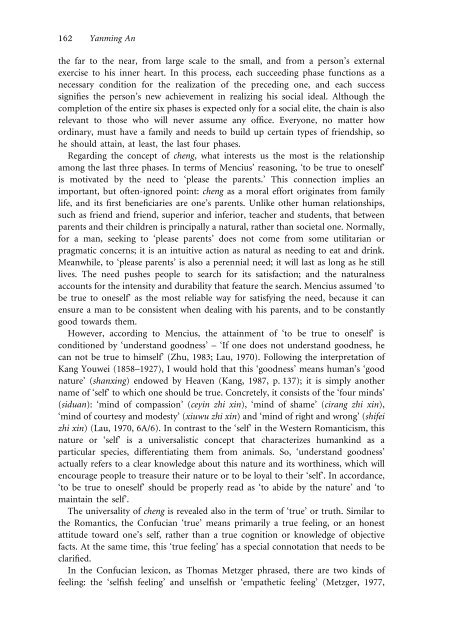Western sincerity and Confucian Cheng
You also want an ePaper? Increase the reach of your titles
YUMPU automatically turns print PDFs into web optimized ePapers that Google loves.
162 Yanming An<br />
the far to the near, from large scale to the small, <strong>and</strong> from a person’s external<br />
exercise to his inner heart. In this process, each succeeding phase functions as a<br />
necessary condition for the realization of the preceding one, <strong>and</strong> each success<br />
signifies the person’s new achievement in realizing his social ideal. Although the<br />
completion of the entire six phases is expected only for a social elite, the chain is also<br />
relevant to those who will never assume any office. Everyone, no matter how<br />
ordinary, must have a family <strong>and</strong> needs to build up certain types of friendship, so<br />
he should attain, at least, the last four phases.<br />
Regarding the concept of cheng, what interests us the most is the relationship<br />
among the last three phases. In terms of Mencius’ reasoning, ‘to be true to oneself’<br />
is motivated by the need to ‘please the parents.’ This connection implies an<br />
important, but often-ignored point: cheng as a moral effort originates from family<br />
life, <strong>and</strong> its first beneficiaries are one’s parents. Unlike other human relationships,<br />
such as friend <strong>and</strong> friend, superior <strong>and</strong> inferior, teacher <strong>and</strong> students, that between<br />
parents <strong>and</strong> their children is principally a natural, rather than societal one. Normally,<br />
for a man, seeking to ‘please parents’ does not come from some utilitarian or<br />
pragmatic concerns; it is an intuitive action as natural as needing to eat <strong>and</strong> drink.<br />
Meanwhile, to ‘please parents’ is also a perennial need; it will last as long as he still<br />
lives. The need pushes people to search for its satisfaction; <strong>and</strong> the naturalness<br />
accounts for the intensity <strong>and</strong> durability that feature the search. Mencius assumed ‘to<br />
be true to oneself’ as the most reliable way for satisfying the need, because it can<br />
ensure a man to be consistent when dealing with his parents, <strong>and</strong> to be constantly<br />
good towards them.<br />
However, according to Mencius, the attainment of ‘to be true to oneself’ is<br />
conditioned by ‘underst<strong>and</strong> goodness’ – ‘If one does not underst<strong>and</strong> goodness, he<br />
can not be true to himself’ (Zhu, 1983; Lau, 1970). Following the interpretation of<br />
Kang Youwei (1858–1927), I would hold that this ‘goodness’ means human’s ‘good<br />
nature’ (shanxing) endowed by Heaven (Kang, 1987, p. 137); it is simply another<br />
name of ‘self’ to which one should be true. Concretely, it consists of the ‘four minds’<br />
(siduan): ‘mind of compassion’ (ceyin zhi xin), ‘mind of shame’ (cirang zhi xin),<br />
‘mind of courtesy <strong>and</strong> modesty’ (xiuwu zhi xin) <strong>and</strong> ‘mind of right <strong>and</strong> wrong’ (shifei<br />
zhi xin) (Lau, 1970, 6A/6). In contrast to the ‘self’ in the <strong>Western</strong> Romanticism, this<br />
nature or ‘self’ is a universalistic concept that characterizes humankind as a<br />
particular species, differentiating them from animals. So, ‘underst<strong>and</strong> goodness’<br />
actually refers to a clear knowledge about this nature <strong>and</strong> its worthiness, which will<br />
encourage people to treasure their nature or to be loyal to their ‘self’. In accordance,<br />
‘to be true to oneself’ should be properly read as ‘to abide by the nature’ <strong>and</strong> ‘to<br />
maintain the self’.<br />
The universality of cheng is revealed also in the term of ‘true’ or truth. Similar to<br />
the Romantics, the <strong>Confucian</strong> ‘true’ means primarily a true feeling, or an honest<br />
attitude toward one’s self, rather than a true cognition or knowledge of objective<br />
facts. At the same time, this ‘true feeling’ has a special connotation that needs to be<br />
clarified.<br />
In the <strong>Confucian</strong> lexicon, as Thomas Metzger phrased, there are two kinds of<br />
feeling: the ‘selfish feeling’ <strong>and</strong> unselfish or ‘empathetic feeling’ (Metzger, 1977,


